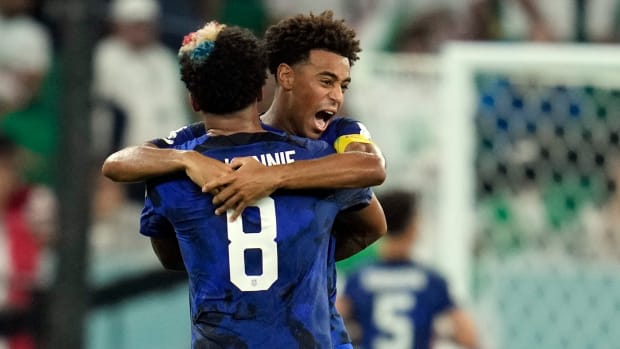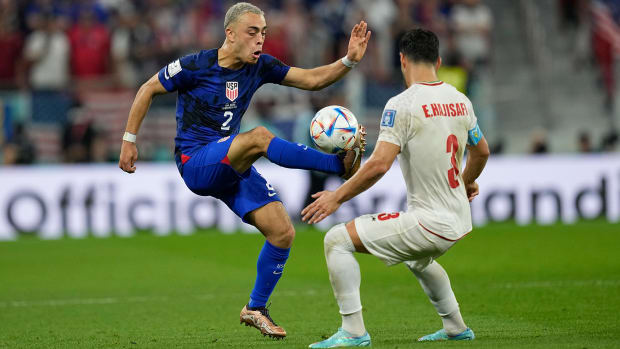European teams in the World Cup have largely been kryptonite to the U.S., and another, the Netherlands, stands in between the Americans and the quarterfinals.
AL RAYYAN, Qatar — The American men have won a single World Cup knockout game in 92 years, and make no mistake, the opponent on that famous day mattered.
There was next to no anxiety when the U.S. kicked off the 2002 World Cup’s round of 16 against Mexico. There wasn’t a team in that tournament that was more familiar, or less intimidating and venerated. The U.S. arrived in Jeonju, South Korea, having beaten El Tri in four of their previous five meetings. And then the Americans won again, 2–0, to reach the World Cup quarterfinals for the first and only time in the modern era.
There, in that rarified air, a team featuring current U.S. coach Gregg Berhalter, GM Brian McBride and sporting director Earnie Stewart lost to Germany, a three-time (and now four) world champion. That defeat, albeit by a one-goal margin, became another data point in a long-term trend even more reliable than “dos a cero.”
The U.S. struggles mightily to beat European sides at the World Cup.
To be fair, lots of teams do—especially lately. As more and more TV and sponsorship money flows from around the world into Europe, especially Western Europe, the clubs and federations there have widened the developmental gap with the rest of the planet. From the inaugural World Cup in 1930 until the 2002 edition won by Brazil, South America had won nine titles compared to Europe’s eight. But then the tide turned emphatically. The past four tournaments were won by four different UEFA nations, along with 11 of the 12 medals (Argentina’s 2014 silver is the only outlier.)

Ashley Landis/AP
Meanwhile, the U.S.’s record against Europe has been a stark reminder of its place in the global pecking order. The 3–2 defeat of Portugal that catapulted the Americans to the 2002 knockouts is the only World Cup win over European opposition in 19 tries since the U.S. men returned to the World Cup in 1990. The record is 1-11-7, and the winless streak is now 11 following the two group stage draws against Wales and England here in Qatar.
You don’t need to beat a European team to get out of the group. The U.S. leveraged wins over Algeria (2010), Ghana (2014) and then Monday’s dramatic 1-0 decision against Iran to book a second-round berth. But you do have to beat a European team—probably teams—to go on a deep World Cup run. And so the test begins Saturday against Group A winner Netherlands here in Al Rayyan. This Dutch side isn’t considered one of the country’s best, but it’s still loaded with talent and the sort of experience and pedigree that has proven so difficult for the U.S. to overcome. Its coach, Louis van Gaal, managed the Netherlands to the bronze medal at the 2014 World Cup and has won major trophies at the helm of Ajax, Barcelona, Bayern Munich and Manchester United.
"Traditionally European teams are very strong and that’s just how it is,” Berhalter said following the World Cup draw. “So when you play them in a World Cup, it means they got through European qualifying, which means they’re a very good team. I can see a lot of teams struggling with that.
“That’s a great opportunity,” he said of facing UEFA opposition. “There’s always opportunities to be the first team or do something that teams haven’t done and for us, we just look at each opponent, we analyze their strengths and weaknesses and we try to figure out how to beat them.”
The Americans will feel good about the fact that they outplayed both England and Wales for significant stretches of those group-stage contests. The two points earned helped the U.S. (1-0-2) finish second in what was, statistically, the toughest group at this World Cup. The Netherlands won the tournament’s easiest group based on average ranking with wins over Senegal (minus Sadio Mané) and lowly Qatar and a draw with Ecuador. The Oranje’s efficient but unconvincing run has been sparked by breakout World Cup star Cody Gakpo, a 23-year-old PSV Eindhoven attacker who’s scored in all three games.
“It’s huge opportunity for us,” U.S. captain Tyler Adams said after beating Iran. “It's gonna be an amazing game, I think. We’ve obviously played against good competition here like England, [and the] Netherlands could be another favorite to win the World Cup.”
Berhalter has significant exposure to the country. He left the University of North Carolina after his junior season and spent six years playing professionally in the Netherlands with PEC Zwolle, Sparta Rotterdam and Cambuur Leeuwarden. The bonds with Saturday’s opponent don’t end there. Sporting director Stewart and right back Sergiño Dest are Dutch natives. U.S. striker Haji Wright and midfielder Luca de la Torre also played in the Netherlands.

Ebrahim Noroozi/AP
The U.S. will be banking on the hope that its increased familiarity with European soccer—17 of the 26 men on Berhalter’s team play there—will help UEFA teams feel less foreign.
“We play in Europe, so we played against a lot of these guys, week-in, week-out,” Adams said ahead of the England game. “It’s not easier to play against European teams, but you're more familiar with how they're gonna play probably than Concacaf teams. So it is what it is. You have to be prepared for all the teams that you can play against.”
This U.S. team, the second youngest here in Qatar (and it’s fielded the three youngest starting lineups), isn’t burdened by predecessors’ shortcomings or global trends older than they are. Almost all grew up as immersed in soccer as their Dutch counterparts, and they’ve worked their way into an echelon of the sport that was out of reach for so many compatriots who came before. Berhalter’s squad is full of men with Champions League experience. There’s a measure of confidence with this group that may be unprecedented.
“I came here saying to everybody in the media and everybody [else], that we're coming here to try to win,” forward Brenden Aaronson said. “We may be the underdog. The Dutch are a world power and they've been that for many, many tournaments. So I think for us, it's just going in there with no fear and playing the way we have been this entire tournament, and I think good things will come out of it.”
Midfielder Weston McKennie added, “We're here for a reason. … We know that a lot of people have [the Dutch] as the favorites. But a lot of people didn't think that we would make it out of the group as well. This team is young [and] has a lot of energy, and this team has a lot of people that doubted us. But we continue to prove them wrong. So we're just looking forward to going out against the Netherlands and playing a good game.”
Since sealing qualification in March, Berhalter has talked about splitting the World Cup into two tournaments. The first, the group stage, was about navigating three matches in nine days, managing form and fitness and playing for points. The second tournament starts Saturday, and it’s one where he’s said repeatedly that “anything can happen.” It’s just one game, which can be decided by one play, one bounce, one inch. There's a sample size that suggests those small margins will still somehow fall the European team’s way. But no UEFA nation has played this specific U.S. team on this stage.
“It’s great to be in this knockout format. We relish this. It’s an opportunity for our guys to keep grinding and to stick together and enjoy this experience,” Berhalter said Tuesday.
“It’s a great opportunity, but it's not something that we're going into it thinking it's an honor,” he continued. “We deserve to be in the position we're in and we want to keep going. And we don't want to be home on [Sunday]. So for us, it's about how do we recover from [the Iran] game and prepare to play against a very, very good Dutch team—very, very well coached, a ton of quality all over the field. And we have to come up with an idea of how to beat them.”